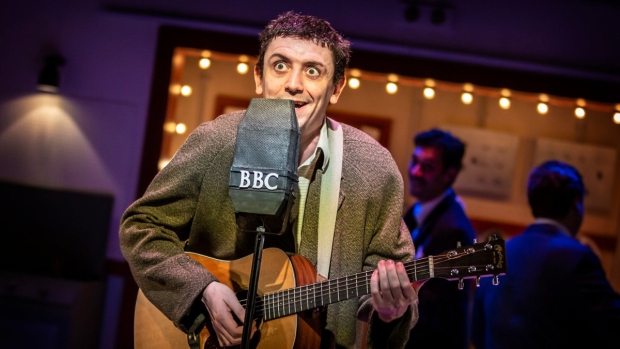Spike starring John Dagleish at Watermill Theatre – review
The play continues its run at the Newbury venue until 5 March 2022

© Pamela Raith
It's 20 years since the whirlwind that was Spike Milligan died, but in Ian Hislop and Nick Newman's wildly joyous recreation of the early years of The Goon Show he walks – or rather bounds around – the earth again. John Dagleish perfectly captures his wild unpredictability, at once instantly engaging for an audience, yet potentially infuriating for the powers that were at the BBC – and indeed on the home front, his put-upon wife June (sympathetic Ellie Morris).
Designer Katie Lias artfully conjures a BBC sound studio post-war, dominated as the action begins by foley artist Sylvia's huge table of ‘tools'. A smiling Margaret Cabourn-Smith is positively assertive as she shares her arcane art to set the scene for the kings of comedy mayhem, recreating sounds including 11 different ‘silences'… Sound effects are er, effectively, the fourth Goon!
Cabourn-Smith's comedic sketch of Sylvia also sets the scene for a heightened account of the Goons' early years, deliciously in the style of Private Eye, Hislop and Newman's organ that celebrates its debt to Milligan with this show.
It's not all celebratory though. Although Dagleish's wonderfully mobile face is a joy to behold, as his smiles and laughs envelop the audience, a vital thread of the action is the Goons' and especially Milligan's constant struggle with his BBC ‘overlords', here represented by Robert Mountford's nameless ‘BBC Executive'. Scarily lofty and contemptuous, and constantly exasperated to the point of spitting blood, Mountford stops just short of a living Spitting Image figure.
To George Kemp and Jeremy Lloyd falls the beguiling challenge of ‘being' Peter Sellers and Harry Secombe. I should better say evoking, for this is what both achieve. Kemp captures the slightly sinister genius of Sellers and Lloyd, warm, expansive and ebullient, demonstrates vividly what a perfect foil Secombe was to both Sellers and Milligan.
James Mack clearly relishes creating the two producers trying to keep order in the studio and to keep the scripts coming from the tortured Milligan during these early years of ‘Goonery': the first, Dennis Main-Wilson, nervy and often negative, very much in thrall to the Executive; succeeded by Peter Eton, fresh from the drama department, so pretty well a breath of fresh air to the Goons, especially Milligan. Mack succeeds in making this pair an essential part of the storytelling.
Also, an essential part of the high comedy is the brilliantly funny caricature of TV and radio programmes featuring lofty eggheads pronouncing on high culture with a capital ‘C'. Cabourn-Smith, Mack and Mountford have a ball with this opportunity to sound off as ‘The Critics' in what is actually a ‘runner' as they reappear more than once during the action.
Cabourn-Smith's pundit gets to dub the Goons' jokiness ‘shell-shock comedy', which returns us to the eponymous Spike, with Hislop and Newman not shirking the challenge of showing the lows of his mental state that dogged him even before the shell shock he suffered after bombardment in Italy during the War. The conundrum now though was that he was only happy when he was writing, but writing to deadlines stressed him out. As the whole edifice of the Goons comedy was built on his writing (as cleverly demonstrated in Lias' design, with an untidy pile of discarded paper growing above the studio ceiling), it's easy to see why this was a perfect storm, especially in Dagleish's nuanced performance. From Spike's perspective, just as unfeeling officers failed to support him in the field, the BBC executives were not sympathetic either. The revelation that writer performer Milligan earned only half as much as Sellers and that Secombe too earned a whole lot more than Milligan, was especially telling.
Happily though, the play is not I don't think a thinly veiled critique of BBC governance, but a well-rounded celebration of Milligan, and when Dagleish picks up a trumpet just as he did, comedy celebration rises to new heights.
Holding together all this carefully calibrated mayhem is Watermill artistic director Paul Hart, demonstrating his own deep affection for Spike and co and his fine understanding of how best to share the fun and the love with the Watermill audience, who smiled and laughed and cried their way through this ultimately life-affirming two hours.












